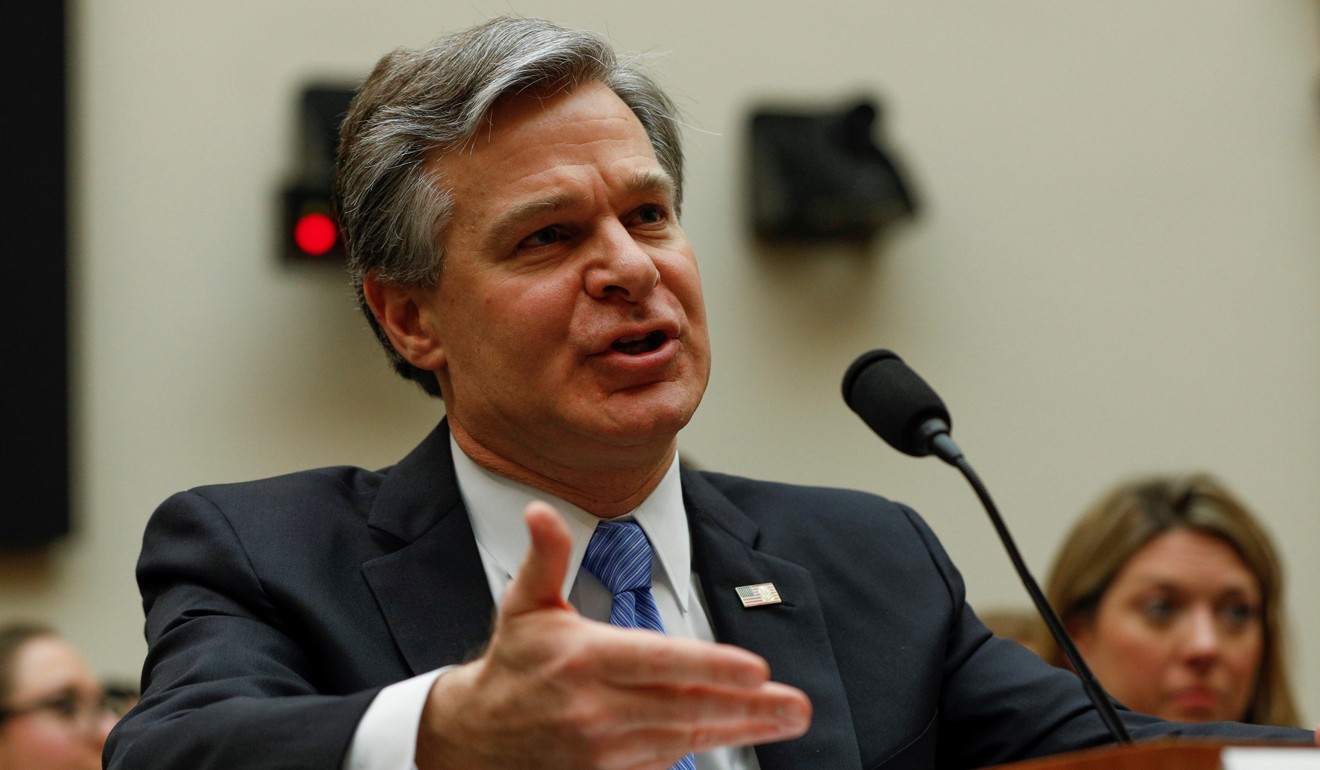
US Attorney General William Barr blasts ‘China’s playbook’ and Huawei’s dominance of 5G, suggests alliance with Nokia and Ericsson
- FBI director says: ‘This is not about the Chinese people as a whole and it’s sure as heck not about Chinese-Americans. But it is about the Chinese government’
- Barr says US companies should consider buying controlling stakes in Huawei’s international rivals

The US is locked in a technological and ideological battle with China that, if mishandled, threatens the nation’s economic prosperity, values and way of life, America’s top justice official said on Thursday.
“China has emerged as the United States’ top geopolitical adversary,” said US Attorney General William Barr in a speech at the Washington-based Centre for Strategic and International Studies (CSIS). “For China, success is a zero-sum game.”
Barr called on American universities, industry, society and its democratic allies to join together in countering the “blitzkrieg” threat posed by China’s authoritarian system before it is too late.
At one point he suggested that US companies should take controlling stakes in the international rivals of Chinese tech giants to counter their rise.

Past administrations and many in the private sector had “too often been willing to countenance China’s hardball tactics – and it has been this administration that has finally moved to confront and counteract China’s playbook”, said Barr, prompting enthusiastic applause from a handful of attendees in the packed hall.
He focused fully half his speech on what he characterised as an era-defining rivalry over 5G technology, an arena in which Chinese companies enjoy somewhat rare technological superiority over their US counterparts.
“The time is very short and we and our allies have to act quickly,” Barr said.
Barr’s past experience as a Verizon telecommunications executive was on display as he outlined the 5G challenge, diving into details on spectrum, base stations, US telecoms infrastructure shortfalls and the need to create a viable market alternative to Huawei Technologies.
In the absence of any real competition, Huawei – which Barr’s department has targeted with numerous criminal indictments over commercial espionage and fraud – is currently pursuing a campaign to supply critical 5G infrastructure to municipal and national governments around the world.
Most recently, and despite Washington’s braying, Britain approved the limited use of Huawei technology in the development of its own 5G network.
Barr said on Thursday that the US should consider throwing its weight behind Huawei’s closest – though still distant – rivals: Finland’s Nokia and Sweden’s Ericsson.
Such a strategy would see American companies take a controlling stake in one or both of the European firms, either directly or through an alliance with other private sector entities from US allies.
“Putting our large market and financial muscle behind one or both of these firms would make it a far more formidable competitor and eliminate concerns over its staying power, or their staying power,” said Barr. “We and our closest allies certainly need to be actively considering this approach.”
Barr was delivering an update on the Department of Justice’s “China Initiative”, a US policy set up by his predecessor in 2018 to identify and counter the Chinese theft of trade secrets and other strategic assets.
The conference included a host of top FBI and Justice Department speakers.
FBI Director Christopher Wray said his agency was honing a variety of traditional and non-traditional tools and tactics to counter what he called the “diverse and multilayered” Chinese threat.
The FBI is conducting some 1,000 China-related investigations across all 56 of its field offices, bureau officials said, complemented by Department of Justice prosecution team leaders centred in five US offices: New York; San Francisco; Boston; Dallas, Texas; and Huntsville, Alabama.
Under the China Initiative, the FBI arrested 24 people during the fiscal year ending in September, up from 15 arrests five years ago, officials said. In the last four months, it said it had arrested 19 more people.
“We are not seeking a rise in cases for the numbers,” said John Brown, assistant director of the FBI’s counterintelligence division, but rather to check what he called the biggest US threat since Washington tried to counter Moscow during the Cold War.
The US government’s aggressive pursuit of such criminal cases has prompted accusations – from individuals in academia, the private sector and even the military – of racial profiling.
On Thursday, officials sought to dispute that charge.
“This is not about the Chinese people as a whole and it’s sure as heck not about Chinese-Americans,” said Wray. “But it is about the Chinese government.”
Barr, who has generally limited his public criticism of China to matters of commercial malpractice, also fired shots at Beijing over its treatment of Muslims in Xinjiang, its internet censorship and its opposition to “self-determination” in Hong Kong.
According to recent reporting by The New York Times, which cited an unpublished manuscript by former national security adviser John Bolton, Barr has expressed unease at US President Donald Trump’s apparent closeness with Chinese President Xi Jinping.
In private conversations with Bolton, Barr raised concerns that Trump had led autocratic leaders, including Xi, to believe that he had “undue influence” over what should be considered independent judicial matters, The Times reported.
In May 2018, Trump announced that he was working with Xi to get ZTE, a Chinese telecommunications giant that Washington had banned from procuring US technology, “back into business”. Several weeks later, the US administration lifted the ban under an agreement in which the company put US$400 million in escrow.
Purchase the China AI Report 2020 brought to you by SCMP Research and enjoy a 20% discount (original price US$400). This 60-page all new intelligence report gives you first-hand insights and analysis into the latest industry developments and intelligence about China AI. Get exclusive access to our webinars for continuous learning, and interact with China AI executives in live Q&A. Offer valid until 31 March 2020.